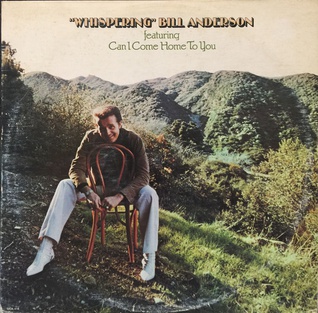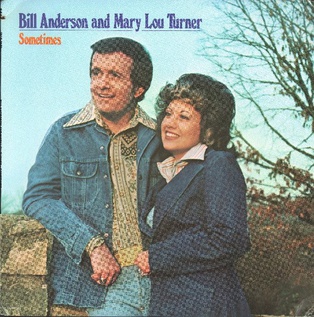Related Research Articles

"Still the One" is a song written by Johanna Hall and John Hall, and recorded by the soft rock group Orleans on their album Waking and Dreaming, released in 1976, which reached No. 5 on the Billboard Hot 100.
"Peanuts and Diamonds" is a song written by Bobby Braddock. It was first recorded by American country singer-songwriter Bill Anderson. It was released as a single in 1976 via MCA Records and became a major hit the same year.
"Liars One, Believers Zero" is a song written by Glenn Martin. It was first recorded by American country singer-songwriter Bill Anderson. It was released as a single in 1976 via MCA Records and became a major hit the following year.

Bill is a studio album by American country singer-songwriter Bill Anderson. It was released in July 1973 on MCA Records and was produced by Owen Bradley. It was Anderson's first studio album to be released on the MCA label after Decca Records merged with the label. It was also his twenty first studio recording to be released and only album project to be issued in 1973. The album included three singles, two of which became number one hits in either the United States and Canada. The album itself also would reach peak positions on national publication charts.

"Whispering" Bill Anderson is a studio album by American country singer-songwriter Bill Anderson. It was released in June 1974 on MCA Records and was produced by Owen Bradley. The album's only single was the track "Can I Come Home to You". It was also his twenty-second studio recording and only album issued in 1974.

Every Time I Turn the Radio On/Talk to Me Ohio is a studio album by American country singer-songwriter Bill Anderson. It was released in January 1975 on MCA Records and was produced by Owen Bradley.

Sometimes is a studio album by American country music artists Bill Anderson and Mary Lou Turner. It was released in January 1976 on MCA Records and was produced by Owen Bradley. It was Anderson's twenty fourth studio recording and Turner's first. The album's title track became a major hit on the country charts in both the United States and Canada. The album also reached major positions on the country chart in the United States. Sometimes was the first collaborative project between Anderson and Turner. Anderson hired Turner to work as his duet partner during this period and the project was one of two recordings they made.

Peanuts and Diamonds and Other Jewels is a studio album by American country singer-songwriter Bill Anderson. It was released in September 1976 on MCA Records. It was co-produced by Owen Bradley and Buddy Killen. It was Anderson's twenty fifth studio recording released during his musical career and second to be released in 1976. The album included three singles issued between 1975 and 1976, two of which became major country hits in both the United States and Canada.
"If You Can Live with It " is a song written and recorded by American country singer-songwriter Bill Anderson. It was released as a single in 1973 via MCA Records and became a major hit the same year.
"Every Time I Turn the Radio On" is a song written and recorded by American country singer-songwriter Bill Anderson. It was released as a single in 1974 via MCA Records and became a major hit the same year.
"I Still Feel the Same About You" is a song written and recorded by American country singer-songwriter Bill Anderson. It was released as a single in 1975 via MCA Records and became a major hit the same year.
"Thanks" is a song recorded by American country singer-songwriter Bill Anderson. It was written by Bill Martin and Phil Coulter and previously recorded by J. Vincent Edwards in 1969. Bill Anderson's version was released as a single in 1975 via MCA Records and became a major hit the same year.
"Head to Toe" is a song written by Bobby Braddock. It was first recorded by American country singer-songwriter Bill Anderson. It was released as a single in 1977 via MCA Records and became a major hit the following year.
"This Is a Love Song" is a song written by Jim Weatherly. It was first recorded by American country singer-songwriter Bill Anderson. It was released as a single in 1979 via MCA Records and became a major hit the same year.
"That's What Made Me Love You" is a song written by Lawrence Shoberg. It was first recorded as a duet by American country artists Bill Anderson and Mary Lou Turner. It was released as a single in 1976 via MCA Records and became a major hit the same year.
"Where Are You Going, Billy Boy" is a song written by Dave Kirby and Glenn Martin. It was first recorded as a duet by American country artists Bill Anderson and Mary Lou Turner. It was released as a single in 1977 via MCA Records and became a major hit the same year.
"Double S" is a song written by Bill Anderson and Buddy Killen. It was first recorded by its co-writer and American country singer-songwriter Bill Anderson. It was released as a single in 1978 via MCA Records and became top 40 hit single.
"The Dream Never Dies" is a song written by Richard Cooper. It was first recorded by his band The Cooper Brothers in 1978 and included on their self-titled Capricorn Records album. It was also released as a single, b/w "Rock and Roll Cowboys". American country singer-songwriter Bill Anderson released it as a single in 1979 via MCA Records and had a top 40 hit single. Juice Newton also recorded the song that same year and released on her Take Heart album.
"Country D.J." is a song written and first recorded by American country singer-songwriter Bill Anderson. It was released as a single in 1975 via MCA Records and became top 40 hit single.

The singles discography of American country singer-songwriter Bill Anderson contains 84 singles, three promotional singles, 6 other charted songs and four music videos. After signing to Decca Records in 1958, Anderson released a series of early singles that became hits, reaching the top ten and 20. This included "That's What It's Like to Be Lonesome" (1958), "The Tip of My Fingers" (1960) and "Po' Folks" (1961). The following year, he reached number one on the Billboard Country and Western Sides chart with "Mama Sang a Song." In 1963, Anderson released his most commercially successful single, "Still." The song was his second number one country single and his first top ten hit on the Billboard Hot 100, climbing to number eight. His follow-up single, "8×10" reached similar crossover success. Anderson released 11 more top ten country hits during the rest of the decade. This included the number one singles "I Get the Fever" (1966) and "My Life " (1969). He also had a number one hit with Jan Howard called "For Loving You" in 1968. Anderson also had top ten hits with "I Love You Drops" (1965), "Happy State of Mind" (1968) and a cover of "But You Know I Love You" (1969).
References
- ↑ "Whispering Bill Anderson: Bill Anderson: Songs, Reviews, Credits". Allmusic . Retrieved 24 July 2020.
- 1 2 Anderson, Bill (June 1974). "Whispering Bill Anderson (Album Information and Liner Notes)". MCA Records .
- ↑ Whitburn, Joel (2008). Hot Country Songs 1944 to 2008. Record Research, Inc. ISBN 978-0-89820-177-2.
- ↑ ""Can I Come Home to You" chart history". Billboard . Retrieved 24 July 2020.
- ↑ "Search results for "Bill Anderson" -- Country Singles". RPM . 17 July 2013. Retrieved 9 April 2020.
- ↑ "Bill Andertson -- "Can I Come Home to You" (1974, Vinyl)". Discogs . 1974. Retrieved 24 July 2020.
- ↑ "Bill Anderson Chart History (Hot Country Songs)". Billboard. Retrieved July 24, 2020.